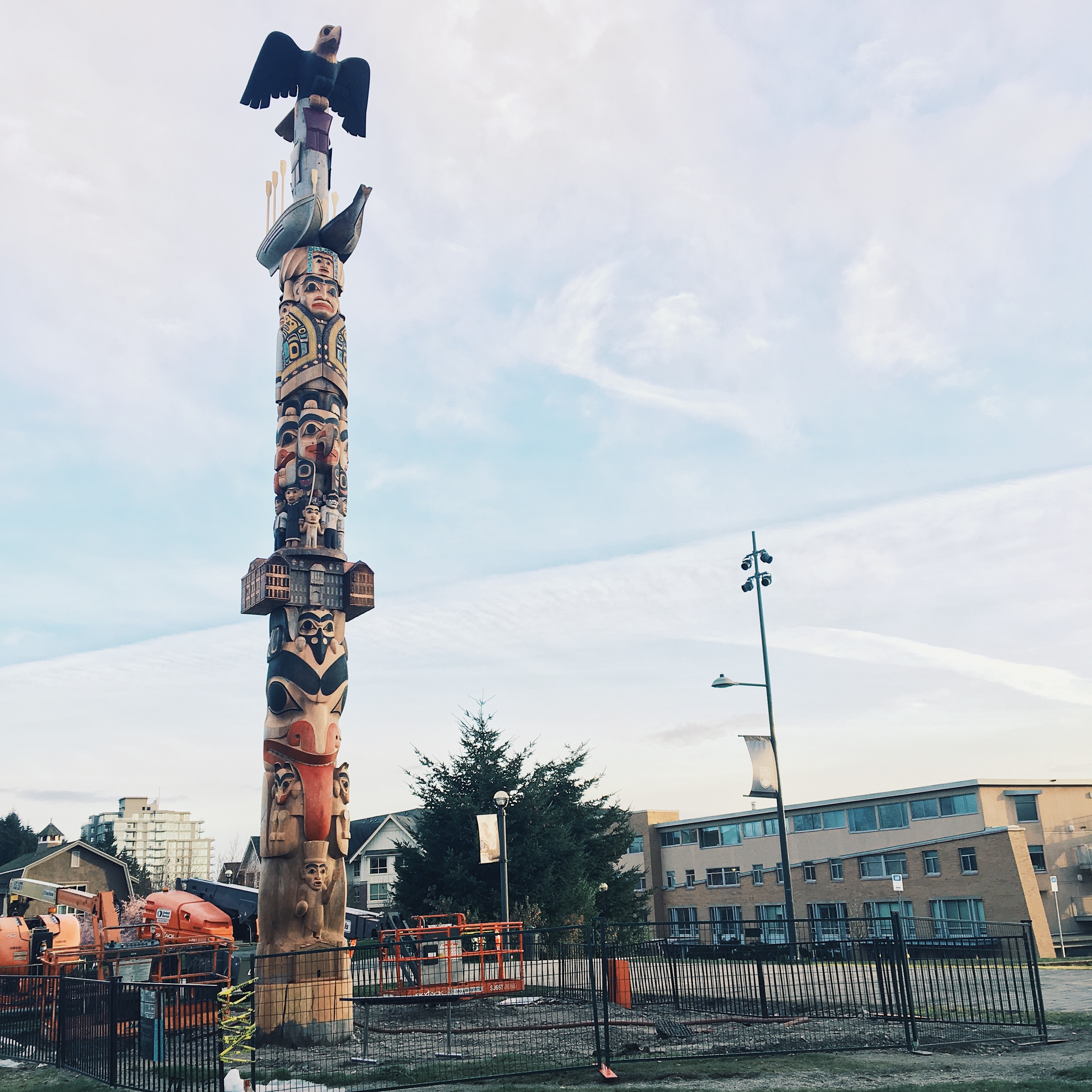Appropriate Discomfort
This photo was taken on Thursday, April 6th, 2017 on the UBC Campus at the site of the Reconciliation Pole. The photo is of the pole itself, still surrounded by the chest high construction fence and the equipment that aided in its erection.
The reconciliation pole was carved by James Hart, Haida master carver and hereditary chief, and is marked by thousands of copper nails to represent the thousands who died in the Residential School system (UBC, 2017).
I want to start by saying something that not enough people in my position do, I am eternally grateful for the privilege that I’ve been granted and regardless of my want for use of it, I know for a fact they’re part of how I got this far at all. As a straight passing, white, middle-class women I grew up with the expectation that I was going to university. Not the hope or the assumption, the expectation. When I was researching Universities, one of the drawing factors of the University of British Columbia (along with the beautiful campus and the idea of BC healthcare covering my insulin) was its emphasis on a multicultural, racially diverse student body. When my mother and I took the tour, the guide was sure to mention the totem pole across from Mercante (the one by the bookstore wouldn’t go up until part of the way through my first year) and was elated when I asked about the Museum of Anthropology. I distinctly remember he calling the MOA a “selling point” for the school. That part went in one ear and out the other at the time.
Last year, I was ecstatic to be able to take my first ever GRSJ course. I expected it to be a mark booster, something that required very little effort. I thought it would be easy. What I didn’t expect was to confront my own privileges and internal biases, to leave the class more often than not deeply disillusioned with the world. It was one of the best classes I’ve ever taken.
But I eventually came back to the phrase, a “selling point.”
Locally, This effects Vancouver as a whole. The UBC is clearly known for the mantra that is repeated that the beginning of every event and many classes, “UBC’s Point Grey Campus is located on the traditional, ancestral, unceded territory of the Musqueam people” (UBC,2015), and yet there is seems to be a belief that those violent colonial days are behind us. After all, the UBC mascot is the Thunderbird, right? To refer to any part of the campus that is representative of the Musqueam First Nations people as a “selling point,” a measure of commerce, for the University as a whole is reductive at best and a violent rejection of the past of these lands at the worst. This is, simply, the commodification of a culture that has been and continues to be oppressed within Vancouver, their use as another reason to admire the University.
Globally, tourists flock to the MOA to take in the rich cultural heritage of the West Coast and congregate in Stanley Park. They admire the past at arm’s length, never delving deeper and ignoring as best they can blood that stains the rocky beaches. There is an acceptance, almost an expectation, that the history of the First Nations people will be used by the city as culture capital. More commodification.
The Reconciliation Pole feels like a step forward. A step away from the commodification. The pole went up with the community, for the victims, and with the University taking a back seat to the recognition of past wrongdoing, past horrors. My GRSJ 224 professor used to insist that if you aren’t upset then you aren’t paying attention and standing under the Reconciliation Pole, taking pictures for this blog post, it was uncomfortable. But it’s not supposed to be comfortable, its supposed to be a reminder of the awful things done under the false name of progress or manifest destiny. Not all discomfort is bad. At the very least, it’s significantly harder to commodify.
Works Cited:
“Reconciliation Pole Installed on UBC Vancouver Campus.” UBC News. UBC, 30 Mar. 2017. Web. 9 Apr. 2017. <https://news.ubc.ca/2017/03/30/reconciliation-pole-to-be-installed-on-ubc-vancouver-campus/>.
Bonar, Thane. “Musqueam & UBC.” Aboriginal Portal. UBC, 27 Nov. 2015. Web. 10 Apr. 2017. <http://aboriginal.ubc.ca/community-youth/musqueam-and-ubc/>.
